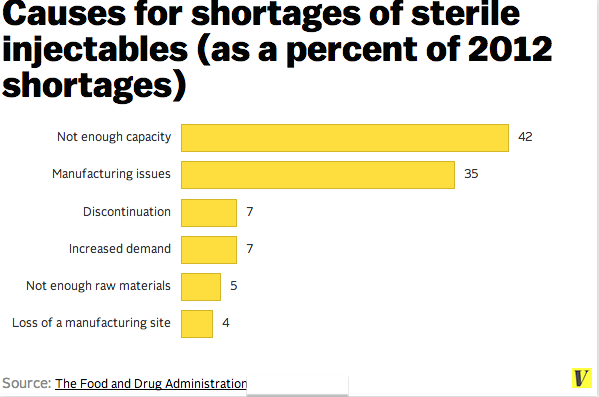The news: Saline is essentially a fancy word for salt and water, albeit in a sterile condition. It is used in all manners of crucial, intravenous procedures, from dialysis to hydration. Still, it sounds like a rather no-frills product — how hard can it be to mix salt and water together?
Apparently, pretty hard.
Since January hospitals across the country have been struggling to cope with a saline shortage. In fact, it got so bad that last month the Food and Drug Administration (FDA) started to import shipments of 0.9% saline solution from a manufacturing facility in Norway. A bag of saline solution, which used to go for a $1, can now fetch five or six times that.
It seems ludicrous to imagine bags of salt water being flown across the Atlantic when we have facilities that could easily manufacture it at home, but it's hardly that simple.
Why do we have a saline shortage? Despite the huge market and demand, the production of saline is concentrated among a few companies, which means that if even one of them has a problem — like, say, a recall — there can be huge consequences for the entire country.

Image Credit: Vox
It also doesn't help that there was a spike in flu cases earlier this year. Dehydrated flu patients need intravenous saline injections, and this pressing need has exacerbated an already dwindling supply.
And there's no reason why there should be more saline manufacturers. The solution is hardly a high-profit product, and it's a costly challenge to produce the solution in a completely sterile environment to make it safe for injection directly into a patient's veins.
What will happen next? The FDA is working with manufacturers to kick saline production into a higher gear. The agency is also easing regulations so that foreign plants, such as the Norwegian company and the Spanish branch of a company called Baxter, can send some much-needed reinforcements in the meantime.
Hospitals have also had to tackle the challenge of rationing their remaining supply. Some are using smaller-sized bags or diluting the solution with non-saline ingredients. It's a strange and unexpected predicament, but it's a potentially dangerous reality that pharmacists and doctors across the country must face.
No comments:
Post a Comment